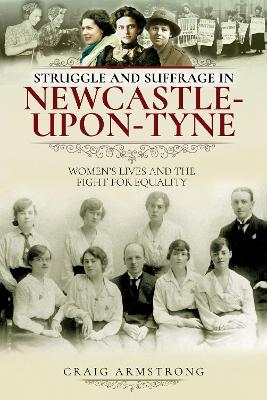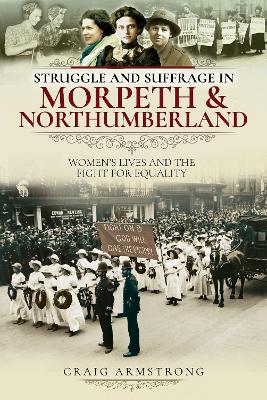Struggle and Suffrage
2 total works
For much of the nineteenth century, the women of Newcastle had occupied crucial, though largely underappreciated and acknowledged, roles within society. Aside from the hard life of raising families in an area where money was often hard to come by, and where much of the available work was labour intensive and dangerous, women were also expected to play a role in bringing money into the household.
The use of female labour in Newcastle was often criticised by visitors to the town, particularly with the use of women on building sites. It was believed that many of the roles undertaken by women had a poor effect on their character, but it also created a unique and colourful variety of local personalities, some of whom were celebrated in song and story.
The period was also one of considerable upheaval. Women were increasingly demanding greater rights and freedoms and Newcastle became a hotbed of support for the suffragist movement. Indeed, a number of prominent Tyneside suffragists and radical suffragettes launched several attacks in the area. The Chancellor was attacked while on a visit to Newcastle to make a political speech, and a number of suffragettes were arrested for damaging properties and for attempting to throw things at him. On another occasion, a bowling clubhouse was burned to the ground in an arson attack made by local, though unidentified, suffragettes.
Women had also been excluded from many of the vital industries on Tyneside. Shipbuilding, heavy engineering, mining, women were excluded from all of these male bastions and there was a prevailing attitude amongst many Newcastle men that women should be kept out of industry as much as possible. The two World Wars changed this, when the rush of men to the colours resulted in these vital industries having to employ ever larger numbers of women and to acknowledge their contributions.
The use of female labour in Newcastle was often criticised by visitors to the town, particularly with the use of women on building sites. It was believed that many of the roles undertaken by women had a poor effect on their character, but it also created a unique and colourful variety of local personalities, some of whom were celebrated in song and story.
The period was also one of considerable upheaval. Women were increasingly demanding greater rights and freedoms and Newcastle became a hotbed of support for the suffragist movement. Indeed, a number of prominent Tyneside suffragists and radical suffragettes launched several attacks in the area. The Chancellor was attacked while on a visit to Newcastle to make a political speech, and a number of suffragettes were arrested for damaging properties and for attempting to throw things at him. On another occasion, a bowling clubhouse was burned to the ground in an arson attack made by local, though unidentified, suffragettes.
Women had also been excluded from many of the vital industries on Tyneside. Shipbuilding, heavy engineering, mining, women were excluded from all of these male bastions and there was a prevailing attitude amongst many Newcastle men that women should be kept out of industry as much as possible. The two World Wars changed this, when the rush of men to the colours resulted in these vital industries having to employ ever larger numbers of women and to acknowledge their contributions.
For much of the nineteenth century, the women of Northumberland had occupied crucial, though largely underappreciated and acknowledged, roles within society. Aside from the hard life of raising families in an area where money was often hard to come by, and where much of the available work was labour intensive and dangerous, women were also expected to play a role in bringing money into the household.
In what was a largely agrarian county, female labourers, who were known as bondagers, were widely respected for their contribution to the local economy although there were those who criticised the system for forcing women to undertake hard manual labour. The farming economy in Northumberland depended so much upon female labour that many men found that it was far easier to be taken on by a prospective employer if they could assure that employer that they would be able to bring a suitable female worker with them.
The period was also one of considerable upheaval. There were a number of prominent Northumbrian suffragists and the local radical suffragettes launched a number of attacks in the area. Morpeth was a very early supporter of women's suffrage and the Mayor and local council actively gave their support to the cause, although they remained largely opposed to the actions of the suffragettes. Although born in London, Emily Wilding Davison's mother was Northumbrian and she had a wide network of relations in Morpeth and throughout the county. After her father's death her mother had relocated to the Northumberland village of Longhorsley and Emily spent long period with her, recuperating after her numerous hunger strikes. Famously losing her life after being struck by the King's horse at the 1913 Derby, Emily was buried with great ceremony in a quiet Morpeth churchyard and to this day she remains one of Morpeth's most famous (adopted) daughters, with her grave remaining a sight of pilgrimage for many supporters of women's rights.
In what was a largely agrarian county, female labourers, who were known as bondagers, were widely respected for their contribution to the local economy although there were those who criticised the system for forcing women to undertake hard manual labour. The farming economy in Northumberland depended so much upon female labour that many men found that it was far easier to be taken on by a prospective employer if they could assure that employer that they would be able to bring a suitable female worker with them.
The period was also one of considerable upheaval. There were a number of prominent Northumbrian suffragists and the local radical suffragettes launched a number of attacks in the area. Morpeth was a very early supporter of women's suffrage and the Mayor and local council actively gave their support to the cause, although they remained largely opposed to the actions of the suffragettes. Although born in London, Emily Wilding Davison's mother was Northumbrian and she had a wide network of relations in Morpeth and throughout the county. After her father's death her mother had relocated to the Northumberland village of Longhorsley and Emily spent long period with her, recuperating after her numerous hunger strikes. Famously losing her life after being struck by the King's horse at the 1913 Derby, Emily was buried with great ceremony in a quiet Morpeth churchyard and to this day she remains one of Morpeth's most famous (adopted) daughters, with her grave remaining a sight of pilgrimage for many supporters of women's rights.

